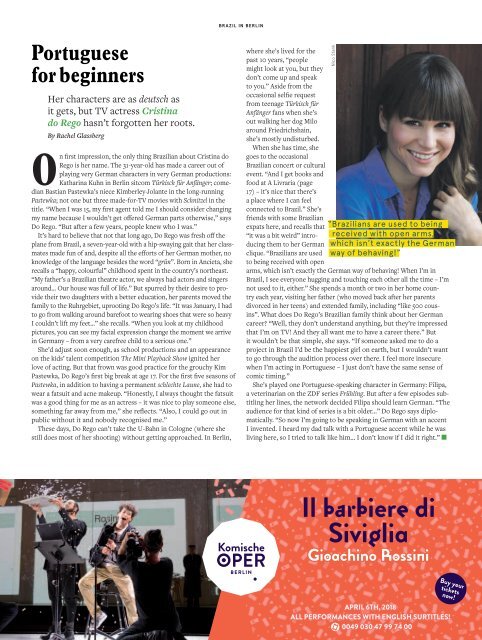EXBERLINER Issue 170, April 2018
Create successful ePaper yourself
Turn your PDF publications into a flip-book with our unique Google optimized e-Paper software.
Portuguese<br />
for beginners<br />
Her characters are as deutsch as<br />
it gets, but TV actress Cristina<br />
do Rego hasn’t forgotten her roots.<br />
By Rachel Glassberg<br />
On first impression, the only thing Brazilian about Cristina do<br />
Rego is her name. The 31-year-old has made a career out of<br />
playing very German characters in very German productions:<br />
Katharina Kuhn in Berlin sitcom Türkisch für Anfänger; comedian<br />
Bastian Pastewka’s niece Kimberley-Jolante in the long-running<br />
Pastewka; not one but three made-for-TV movies with Schnitzel in the<br />
title. “When I was 15, my first agent told me I should consider changing<br />
my name because I wouldn’t get offered German parts otherwise,” says<br />
Do Rego. “But after a few years, people knew who I was.”<br />
It’s hard to believe that not that long ago, Do Rego was fresh off the<br />
plane from Brazil, a seven-year-old with a hip-swaying gait that her classmates<br />
made fun of and, despite all the efforts of her German mother, no<br />
knowledge of the language besides the word “grün”. Born in Ancieta, she<br />
recalls a “happy, colourful” childhood spent in the country’s northeast.<br />
“My father’s a Brazilian theatre actor, we always had actors and singers<br />
around... Our house was full of life.” But spurred by their desire to provide<br />
their two daughters with a better education, her parents moved the<br />
family to the Ruhrgebiet, uprooting Do Rego’s life. “It was January, I had<br />
to go from walking around barefoot to wearing shoes that were so heavy<br />
I couldn’t lift my feet...” she recalls. “When you look at my childhood<br />
pictures, you can see my facial expression change the moment we arrive<br />
in Germany – from a very carefree child to a serious one.”<br />
She’d adjust soon enough, as school productions and an appearance<br />
on the kids’ talent competition The Mini Playback Show ignited her<br />
love of acting. But that frown was good practice for the grouchy Kim<br />
Pastewka, Do Rego’s first big break at age 17. For the first five seasons of<br />
Pastewka, in addition to having a permanent schlechte Laune, she had to<br />
wear a fatsuit and acne makeup. “Honestly, I always thought the fatsuit<br />
was a good thing for me as an actress – it was nice to play someone else,<br />
something far away from me,” she reflects. “Also, I could go out in<br />
public without it and nobody recognised me.”<br />
These days, Do Rego can’t take the U-Bahn in Cologne (where she<br />
still does most of her shooting) without getting approached. In Berlin,<br />
BRAZIL IN BERLIN<br />
where she’s lived for the<br />
past 10 years, “people<br />
might look at you, but they<br />
don’t come up and speak<br />
to you.” Aside from the<br />
occasional selfie request<br />
from teenage Türkisch für<br />
Anfänger fans when she’s<br />
out walking her dog Milo<br />
around Friedrichshain,<br />
she’s mostly undisturbed.<br />
When she has time, she<br />
goes to the occasional<br />
Brazilian concert or cultural<br />
event. “And I get books and<br />
food at A Livraria (page<br />
17) – it’s nice that there’s<br />
a place where I can feel<br />
connected to Brazil.” She’s<br />
friends with some Brazilian<br />
expats here, and recalls that<br />
“it was a bit weird” introducing<br />
them to her German<br />
clique. “Brazilians are used<br />
to being received with open<br />
Nico Stank<br />
“Brazilians are used to being<br />
received with open arms,<br />
which isn’t exactly the German<br />
way of behaving!”<br />
arms, which isn’t exactly the German way of behaving! When I’m in<br />
Brazil, I see everyone hugging and touching each other all the time – I’m<br />
not used to it, either.” She spends a month or two in her home country<br />
each year, visiting her father (who moved back after her parents<br />
divorced in her teens) and extended family, including “like 500 cousins”.<br />
What does Do Rego’s Brazilian family think about her German<br />
career? “Well, they don’t understand anything, but they’re impressed<br />
that I’m on TV! And they all want me to have a career there.” But<br />
it wouldn’t be that simple, she says. “If someone asked me to do a<br />
project in Brazil I’d be the happiest girl on earth, but I wouldn’t want<br />
to go through the audition process over there. I feel more insecure<br />
when I’m acting in Portuguese – I just don’t have the same sense of<br />
comic timing.”<br />
She’s played one Portuguese-speaking character in Germany: Filipa,<br />
a veterinarian on the ZDF series Frühling. But after a few episodes subtitling<br />
her lines, the network decided Filipa should learn German. “The<br />
audience for that kind of series is a bit older...” Do Rego says diplomatically.<br />
“So now I’m going to be speaking in German with an accent<br />
I invented. I heard my dad talk with a Portuguese accent while he was<br />
living here, so I tried to talk like him... I don’t know if I did it right.” n<br />
Il barbiere di<br />
Siviglia<br />
Gioachino Rossini<br />
Buy your<br />
tickets<br />
now!<br />
<strong>April</strong> 6th, <strong>2018</strong><br />
All performAnces with english surtitles!<br />
0049 030 47 99 74 00<br />
11

















